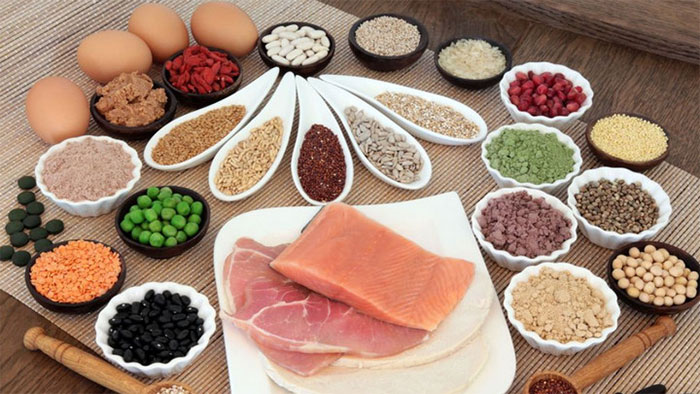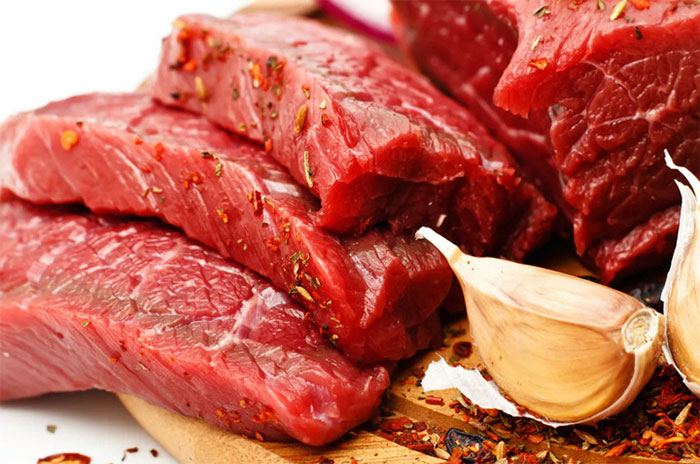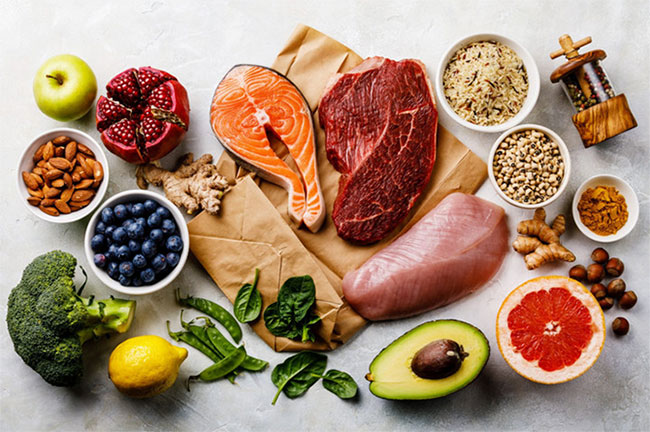Any excess nutritional intake can also affect your health and too much protein in your body will cause unpredictable illnesses that you never thought possible.
Harmful by eating too much protein
Protein is an essential part of a healthy diet. It helps rebuild and repair muscles, organs and bones. High protein diets have also been found to be helpful in losing fat, losing weight, increasing feelings of fullness, and maintaining muscle mass.
However, a high protein diet also comes with a number of risks that you should be aware of and understand. Nutritionists do not recommend eating too much protein, exceeding the recommended daily allowance.
When calculating the total amount of protein that you are eating or should be eating now, take into account the amount of protein in your diet, for example from food and drink sources. You should also look for supplements, if the supplement you are taking has a significant amount of protein, such as protein powder, the protein helps in the repair and repair of muscles, organs, and bones.
What are the risks of eating too much protein?
Consuming large amounts of any nutrient over a long period of time carries risks, even with protein. According to research, consuming too much protein can lead to an increased risk of several health complications. Health issues are linked to too much protein in the body, especially if you are on a diet that is too high in protein for a long time.
Weight gain
Diets high in protein can help with weight loss, but this type of weight loss is only short-lived. Excess protein is usually stored as fat, while excess amino acids are excreted. This can lead to weight gain after eating too much protein for a long time, especially if you eat too many calories and keep increasing your protein intake.
A 2016 study found that weight gain was significantly related to a protein diet rather than fat.
Bad breath
Eating large amounts of protein can lead to bad breath, especially if you limit your carbohydrate intake. In a previous study, 40% of participants reported bad breath. Part of this is because your body goes into a metabolic state called ketosis, which produces chemicals that create an unpleasant fruity smell. Brushing and flossing will not get rid of the odor. You can double your water intake, brush your teeth more often, and chew gum to counter some of the bad effects of eating too much protein.
Constipation
In the same study, 44% of participants reported suffering from constipation. Diets high in protein and low in carbohydrate are often low in fiber and easily lead to constipation. Increasing the intake of water and fiber can help prevent constipation.
Diarrhea
Eating too much milk or processed foods and lacking in fiber can cause diarrhea. This is especially true if you are lactose intolerant or if you eat protein sources like meat, fish, and poultry. Instead, eat heart-healthy protein. To avoid diarrhea, drink plenty of fluids, avoid caffeinated drinks, limit fried foods, and eat excess fat and increase your fiber intake.
Dehydration
Your body gets rid of excess nitrogen from a high protein diet with fluids and water. It can make you dehydrated, although you are not more thirsty than usual.

A high protein intake has minimal impact on hydration.
A small 2002 study of athletes showed that as protein intake increases, hydration levels in the water supply decrease. However, a 2006 study concluded that a high protein intake had minimal impact on hydration.
We can reduce this risk or effect by increasing our water intake, especially if you are an active person. Regardless of your protein diet, it’s important to drink plenty of fluids throughout the day.
Kidney damage
While there are no major studies linking high protein intake and kidney damage in healthy people, too much protein can cause damage in people with pre-existing kidney disease.
This is because an excess of nitrogen is found in the amino acids that make up the protein. Damaged kidneys have to work harder to remove excess nitrogen and wastes from protein metabolism. However, a 2012 study looked at the effects of a low-carb, high-protein diet compared to a low-fat diet on the kidneys and found many surprises.
Research shows that in healthy obese adults, dieting low in carbohydrates and high in protein for two years has not been associated with adverse effects on dialysis, albuminuria, or nutritional balance. Fluid and electrolyte compared to a low fat diet.
Increased risk of cancer
Studies have shown that certain high protein diets, especially those based on red meat, can increase the risk of health problems, including cancer. Eating a lot of red meat or processed meat can cause cancer of the rectum, breast, and prostate.
Conversely, consuming protein from other sources can reduce the risk of cancer. Scientists believe that this is in part due to hormones, carcinogenic compounds, and fats found in meat.
Heart disease
Eating lots of red meat and high fat dairy products is typical of a high protein diet. But it can increase your risk for heart disease.
 Eating lots of red meat and high-fat milk has been shown to increase the risk of coronary heart disease.
Eating lots of red meat and high-fat milk has been shown to increase the risk of coronary heart disease.
The cause may be related to the higher amount of saturated fat and cholesterol absorbed. According to a 2010 study, eating lots of red meat and high-fat milk has been shown to increase the risk of coronary heart disease in women. Eating poultry, fish and nuts reduces the risk of disease.
A 2018 study also showed that long-term consumption of red meat may increase trimethylamine N-oxide (TMAO), a chemical made in the gut and linked to heart disease. The results also showed that reducing or eliminating red meat in the diet can reverse these effects.
Calcium deficiency, osteoporosis
Diets high in protein and meat can reduce calcium intake. A lack of calcium has also been linked to osteoporosis and decreased bone stiffness.
A 2013 review found an association between high protein intake and bone and joint health. However, another review found that the effects of protein on bone health were still unclear. Scientists are still carrying out more in-depth studies before drawing any definitive conclusions.
So how much protein is enough?
The ideal daily amount of protein you should consume varies depending on a number of factors including age, gender, activity, health, diet, and more.
 A minimum of 0.8 grams of protein per kilogram of body weight should be consumed per day.
A minimum of 0.8 grams of protein per kilogram of body weight should be consumed per day.
However, in most cases, the recommended daily protein intake for adults is based on your body weight. For most adults with minimal physical activity, experts recommend an average of 0.8 grams of protein per kilogram of body weight per day.
If you exercise primarily with weights for more than an hour on most days of the week, you can eat up to 1.2 to 1.7 grams of protein per kilogram of body weight per day to replenish muscle loss.
However, for athletes sometimes they need to eat up to 3.5 grams of protein per kilogram of body weight without any side effects. Overall, experts estimate that most healthy adults can tolerate 2 grams of protein per kilogram of body weight per day for long periods of time.
Best source of protein
When choosing foods high in protein, be sure to choose healthier foods. This can help reduce the risk of some of the negative effects of a high protein diet. Healthy sources of protein include:
 When choosing foods high in protein, be sure to choose healthy foods.
When choosing foods high in protein, be sure to choose healthy foods.
Pasture Raised Poultry
Wild fish
Eggs from hens raised on farms
Grass-fed cow’s milk and organic milk
The pea tree
Nuts
Cereals
Try to avoid fatty meats, dairy products, and fried or processed sources of protein. Instead, eat heart-healthy protein.
When to see excess protein
It is important to weigh the risks before starting a high protein diet and determining if this diet is right for you. Be sure to check with your doctor before starting any new diet, especially if you have a medical history.
Your doctor and dietitian can help you weigh the pros and cons of a high protein diet based on your individual needs.
In general, you need to eat a healthy, balanced diet and lead an active lifestyle. Always tailor your exercise program to meet your goals, whether it’s losing weight or gaining muscle in the healthiest way and you can maintain it if it works.


